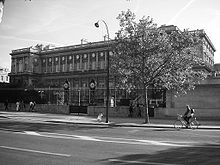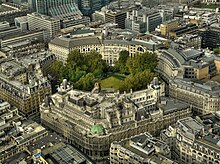Jean Jules Jusserand
Jean-Adrien-Antoine-Jules Jusserand (born February 18, 1855 in Lyon , † July 18, 1932 in Paris ) was a French diplomat and literary historian .
Life
Jean Jules Jusserand was the first child of Jules Jusserand (1800–1871), a lawyer from a long-established Lyonese jewelry family, and his second wife, Marie Adrienne Tissot. Three siblings followed: Etienne (* 1856), Jeanne (* 1857) and Francica (* 1858). The family lived in Saint-Haon-le-Châtel during his childhood ; the children went to school in Lyon, where the family also lived and spent the winter months. The four siblings received a profound Catholic upbringing and music lessons from their mother. From the autumn of 1865, Jules Jusserand attended the Lyon boarding school, Les Chartreux, run by priests. There he also learned English and Italian. After the death of his father in 1871, the successful student became head of his family. For three years he studied humanities and natural sciences from 1872 and graduated in law in Lyon. He continued his broad study interest in 1875 at a university in Paris, with a focus on law. In the fall of that year he took part in a competition for a post in the consular service, which took him to Great Britain as part of a preparatory year. There he got to know the country and its people and began preparing for his dissertation. The next year he got the desired Paris post as élèves-consul , which, however, mainly consisted of making copies. He also worked on his two dissertations, which he completed in 1877 and 1878, respectively. 1878 began his time as a prospective consul in the consulate general at Finsbury Circus in London. After a two-year stay, he returned to Paris, where he became the personal secretary of the Foreign Minister Jules Barthélemy-Saint-Hilaire , who was an Aristotle specialist. After an analysis of a possible French occupation of Tunis in 1881 found the approval of his superiors, he was transferred from the economic to the diplomatic department of the consular service and sent to Tunis for three months to report in December. On his return, Jusserand became head of Charles de Freycinet's newly established department for the Tunisian Protectorate, as he was now considered an expert on Tunisia, while he is said to have known nothing about this area before 1880. In the following five years of his activity there, the area of responsibility expanded to include other African areas and Indochina .
In addition to his family duties, he also continued his academic studies. In 1885 Guillaume Guizot offered him to read at the Collège de France to Chaucer's contemporaries and to the English novel before Walter Scott . Both series of lectures have been published. In addition to his own publications on English literary history, he initiated the series "Les Grand Écrivains Français" in 1887, of which he was one of the editors. He also wrote the volume for Pierre de Ronsard . At the end of the year he was transferred to the London Embassy in the service of William H. Waddington , a position he held until June 1890. This was followed by another eight years in Paris, initially as sous-directeur du Nord responsible for Europe , and four as head of the legation in Copenhagen . As sous-directeur du Nord he was assumed to have a certain Anglophilia , which resulted in an aversion to tsarist Russia. For this reason he was also instructed by Jean Casimir-Perier to postpone the publication of his book A Literary History of the English People to a later date. Jusserand's job as envoyé extraordinaire et ministre plénipotentiaire in Copenhagen was to warn of the impending danger from the German Empire. During his stay in Denmark he was invited by the French ambassador Gustave Oliver Lannes de Montebello to Saint Petersburg , where he also had a meeting with Tsar Nicholas II and his wife in March 1899 .
Meanwhile Jusserand cultivated an international correspondence between scholars and knew many well-known cultural figures. On October 14, 1894, he married the daughter of a US banker, who was born and raised in France. He presumably met Elise Richards and her sister Marian in connection with the translation of his books into English.
After he was replaced by Philippe Crozier in Copenhagen in 1902 , Jusserand was French ambassador to Washington, DC from February 1903. He is considered one of those who persuaded the US government to participate in the First World War . In 1917 he won the first Pulitzer Prize in the history section with his work With Americans of Past and Present Days . Four years later he was elected President of the American Historical Association (AHA). In early 1925, the couple returned to France, where they took up residence in Paris and Saint-Haon-le-Châtel. Jusserand continued to write and publish a book on contemporary history: Le Sentiment américain pendant la guerre . His memoir What Me Befell was published posthumously and only in the UK.
Works
- De Josepho Exoniensi vel Iscano: accedunt De bello trojano poematis liber I, necnon notulæ, sæculo XIII conscriptæ, nunc primum e codice manuscripto in Nationali Bibliotheca asservato, depromptæ, (dissertation at the University of Lyon on Joseph von Exeter ) Paris: Librairie Hachette, 1877 .
- Le théatre en Angleterre depuis la conquéte jusqu'aux prédécesseurs immédiats de Shakespeare , (Dissertation on English theater) Paris: E. Leroux, 1878.
- Les Anglais au moyen age: La Vie nomade et les routes d'Angleterre au XIV siècle (2 volumes, 1884–1893) Vol. 1
- Le roman anglais (1886)
- Le Roman au temps de Shakespeare (1887)
- A French Ambassador at the Court of Charles the Second: Le comte de Cominges (1892)
- Les Anglais au moyen age: L'Épopée mystique de William Langland (1893)
- Histoire abrégée de la littérature anglaise (1896)
- Shakespeare en France sous l'ancien régime (1898)
- Les sports et jeux d'exercice dans l'ancienne France (1901)
- Ronsard (1913)
- With Americans of past and present days (1916)
- Amis de la France (1917)
- The school for ambassadors and other essays (1924)
- Grotius étudié par les secrétaires d'Ambassade Français en 1711 (1929)
- Le sentiment américain pendant la guerre (1931)
Awards and honors (selection)
- 1883: chevalier of the Legion of Honor
- 1892: officier of the Legion of Honor
- 1895: Prix Bordin of the Académie des sciences morales et politiques for L'épopée mystique de William Langland
- 1907: Member of the American Philosophical Society
- 1911: Corresponding member of the British Academy
- 1912: Member of the American Academy of Arts and Sciences
- 1917: Pulitzer Prize in the history section
- 1936: Privately funded memorial in Washington's Rock Creek Park depicting a pink granite bench created by JH Friedlander
literature
- Robert J. Young: An American by Degrees: the Extraordinary Lives of French Ambassador Jules Jusserand , 2009. ISBN 978-0-7735-3572-5
Web links
- Works by Jean Jules Jusserand in English
- Robert J. Young: 'Interrogating' Modernity: Bureaucrats, Historians, and French Ambassador Jules Jusserand (PDF; 188 kB) , Journal of Historical Biography 5 (Spring 2009), pp. 23–47.
Individual evidence
- ^ Robert J. Young: An American by Degrees: the Extraordinary Lives of French Ambassador Jules Jusserand , 2009, pp. 3-33. ISBN 978-0-7735-3572-5
- ↑ Entry on the AHA website
- ↑ Robert J. Young: 'Interrogating' Modernity: Bureaucrats, Historians, and French Ambassador Jules Jusserand (PDF; 188 kB) , Journal of Historical Biography 5 (Spring 2009), pp. 23–47.
- ^ Member History: Jean AAJ Jusserand. American Philosophical Society, accessed October 16, 2018 .
- ↑ Website for the memorials in Rock Creek Park
| personal data | |
|---|---|
| SURNAME | Jusserand, Jean Jules |
| ALTERNATIVE NAMES | Jusserand, Jean Adrien Antoine Jules |
| BRIEF DESCRIPTION | French ambassador and Pulitzer Prize winner |
| DATE OF BIRTH | February 18, 1855 |
| PLACE OF BIRTH | Lyon |
| DATE OF DEATH | July 18, 1932 |
| Place of death | Paris |


